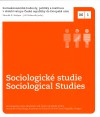Cílem projektu je analyzovat socio-ekonomické hodnoty a normy chování české populace v procesu přibližování standardům zemí EU. Vstup České republiky do EU se totiž netýká jen právní a ekonomické oblasti, ale také běžných pracovních a spotřebních návyků, chování institucí a postojů občanů k vlastní odpovědnosti a očekávání od státu. Protože jde o složitý a mnohorozměrný jev, výzkum by se měl opírat o kontrastní porovnání v těchto rozměrech: 1. srovnání sebeprezentace v politické rétorice, mediích a výzkumech veřejného mínění s externími expertními poznatky; 2. srovnání postojů a očekávání naší populace se zeměmi EU; 3. dynamika postojů a její konzistence či inkonzistence s vývojem společnosti; 4. konfrontace představ názorových vůdců a představitelů důležitých skupin, zejména politiků, administrátorů a podnikatelů. Výzkum se bude opírat o širokou informační základnu a kombinovat kvantitativní a kvalitativní metody. Budou v něm využity metody moderní ekonomické sociologie, výzkumu institucí a sociálních aktérů a také sociální antropologie a socio-ekonomické historie.
Proměny socio-ekonomických hodnot v procesu přibližování ČR k EU. Zadavatel: Grantová agentura ČR, doba řešení: 2003-2005. Řešitel: Jiří Večerník, spolupracovníci: Zdeněk R. Nešpor, Radka Radimská.
Project publications (total 33, displaying 1 - 10)
The volume provides sociological interpretation of policie and institutions in the period of Czech transformation and accession of the Czech Republic to the European Union, as well as involved value bacgrounds.
In international comparative studies exhibits the Czech education system strenghts but also many weaknesses. Czech society is not aware of those weaknesses and is fully satisfied with the quality of Czech education system. This satisfaction could compromise the competitive strangth of Czech school leavers at the global labour market.
The volume provides sociological interpretation of policie and institutions in the period of Czech transformation and accession of the Czech Republic to the European Union, as well as involved value bacgrounds.
Analysis of the socio-economic values, mainly with respect to work, time, collective entities and governance, in the contemporary Czech society and their comparison with Western Europe. The authors maintains strong historic and socio-cultural embeddedness of these categories.
The author discusses the global religious processes that are present in Czech society today. Here he draws on existing quantitative surveys, his ow qualitative sociological and historical pieces of research. He maintains the connections of these transformations with the transformations of the politoval, economic, media, and cultural spheres in European ccontext.
The volume provides sociological interpretation of policie and institutions in the period of Czech transformation and accession of the Czech Republic to the European Union, as well as involved value bacgrounds.
The paper concerns with the transformation of Czech agriculture in an international kontext after 1989, i tis based on data from qualitative research.
The paper concerns with contemporary Czech spirituality/religiosity and its impact on socio-economic values.
The volume presents a study of some of the central dimensions of the complex changes Czech
society has experienced in connection with the transformation after 1989 and the country’s accession
to the European Union. It expands on standard mainstream economic, sociological and political
science approaches to also take into account the historical dimensions of these processes.
The paper written on the basis of a qualitative research describes categorial and value differences between Czech and foreign entrepreneurs in the Czech Republic after 1989.











Facebook
Twitter